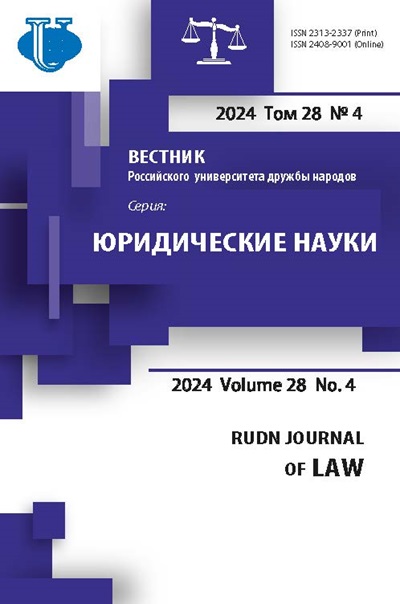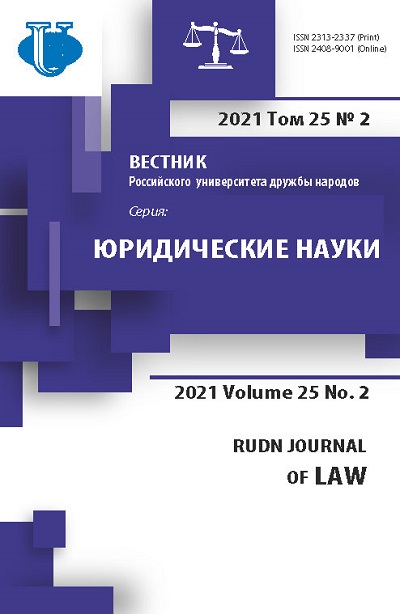University codes of ethics: Legal nature and regulatory effect
- Authors: Panarina M.M.1, Fonotova O.V.1
-
Affiliations:
- National Research University Higher School of Economics (NRU HSE)
- Issue: Vol 25, No 2 (2021)
- Pages: 414-433
- Section: LEGAL RESEARCH METHODOLOGY
- URL: https://journals.rudn.ru/law/article/view/26707
- DOI: https://doi.org/10.22363/2313-2337-2021-25-2-414-433
Cite item
Full Text
Abstract
The issues of determining the subject of the code of ethics of a higher educational institution, identifying its legal characteristics, as well as the particularities of applying this regulator of relations are yet to be studied in Russia. In order to fill the gap in legal knowledge, we have made an attempt, starting with the analysis of the ethics of education in the broad sense, to generalize the Russian and foreign experience in adopting and applying codes of ethics and offer a modern vision of the essence and regulatory function of ethical codes in the practice of educational institutions. The study was conducted using general scientific and special methods of cognition: logical, functional, systemic-structural, methods of generalization, synthesis, induction, and deduction. Certain material conclusions are made based on the sociological research method. The code of ethics of a higher educational institution is a code of conduct for a good faith participant in the educational process. The code is a compromise between different types of ethics: that of a teacher and a student, of a student and an administrative employee. In this regard, the process of discussing specific practical cases and reflection in the code of effective scenarios of interaction between the parties in critical situations are of particular value. In their legal essence, codes of ethics are normative acts, but traditionally they are not regarded as legal acts, as they are adopted by bodies of professional communities and are not often supported by the power of state coercion.
About the authors
Maria M. Panarina
National Research University Higher School of Economics (NRU HSE)
Author for correspondence.
Email: mmpanarina@hse.ru
ORCID iD: 0000-0002-4560-0857
Candidate of Legal Sciences, Associate Professor of the School for Theory of Law and Cross-sectoral Legal Disciplines, the Faculty of Law
20 Myasnitskaya str., Moscow, 101000, Russian FederationOlga V. Fonotova
National Research University Higher School of Economics (NRU HSE)
Email: ofonotova@hse.ru
ORCID iD: 0000-0003-2255-9684
Candidate of Legal Sciences, Associate Professor of the School of Legal Regulation of Business, the Faculty of Law
20 Myasnitskaya str., Moscow, 101000, Russian FederationReferences
- Apresyan, R.G. (2009) On the Ethical Codification of University Life. Terms of Opportunity. Vedomosti NIIJeP: Code of Ethics of the University. (34), 69-85. (in Russian).
- Bakshtanovsky, V., Bogdanova, M. & Sogomonov, Yu. (2009) University as a Scientific-Educational Corporation: Dualism of Self-Identification and the Choice of Priority. Russian Journal of Philosophical Sciences. (3), 78-95. (in Russian).
- Botavina, R.N. (2003) Ethics of Business Relations. Textbook for economic specialties. Moscow, Finance and Statistics Publ. (in Russian).
- Сrosser, P. (1955) The Nihilism of John Dewey. Michigan, Philosophical Library.
- Gabov, A.V. & Yastrebov, O.A. (2020) Local acts of Universities as a means of combating corruption. RUDN Journal of Law. 24 (2), 252-273. doi: 10.22363/2313-2337-2020-24-2-252-273. (in Russian).
- Goode, W.J. (1957) Community within a Community: The Professions. American Sociological Review. 22 (2), 194-200.
- Gulius, N. S. (2015) Code of ethics of the university as a tool of the corporate culture transformation (case based on the activities of the National Research Tomsk State University). In: Talent management and corporate culture transformation: materials of the International conference “HR trend 2015: talent management and corporate culture transformation”. Tomsk, pp. 184-188. (in Russian)
- Habermas, Jü. (1983) Moralbewusstsein und Kommunikatives Handeln. Social theory, 2nd edition. Suhrkamp. (in German).
- Hamza, M.A. & Ahmed, A. (2016) The Existential Paradox between Code and Conduct: Decoupling and Its Far-Reaching Consequences in Higher Education. Pakistan Journal of Commerce and Social Sciences. 10 (3), 547-568. Available at: https://ssrn.com/abstract=2986377 [Accessed: 07th February 2021].
- Heermance, E.L. (1926) The Ethics of Business: A Study of Current Standards. New York, Harper & Bros.
- Johnson, V. (2012) Higher Education, Corruption, and Reform. Contemporary Readings in Law and Social Justice. 4 (1), 478-495. Available at: https://ssrn.com/abstract=2891936 [Accessed: 07th February 2021].
- Marx, K. & Engels, F. (1956) From an Early Work. T. 3. Moscow, Politizdat Publ. (in Russian).
- Moore, G. (2006) Managing Ethics in Higher Education: Implementing a Code or Embedding Virtue? Business Ethics: A European Review. 15 (4), 407-418. DOI: http://dx.doi.org/10.1111/j.1467-8608.2006.00462.x
- Safonov, K.B. (2013) Ethical codes: problems of creation and application. Perm University Herald. Series “Philosophy. Psychology. Sociology”. 1 (13), 54-57. (in Russian).
- Savvina, O.V. (2011) Academic Ethics: General Principles and Applied Aspects. Diss … cand. in Philosophy of sciences. Moscow, Lomonosov Moscow State University. (in Russian).
- Sharma, J. & Kapoor, N. (2013) Teachers’ Role in University Governance - A Study of University of Delhi. Journal of Commerce and Business Studies, Delhi School of Economics, University of Delhi. Available at: https://ssrn.com/abstract=2996376 [Accessed: 07th February 2021].
- Sidorin, A.V. & Sidorin, V.V. (2015) The University Code of Ethics as the Basis for the Corporate Culture of the Technical University. Standard Model. University Management: Practice and Analysis. (1), 104-119. (in Russian).
- Tuguz, F.K. & Lyausheva, S.A. (2013) Ethical code of the University as a resource for students’ socialization. The Bulletin of the Adyghe State University, the series “Region Studies: Philosophy, History, Sociology, Jurisprudence, Political Sciences and Culturology”. 4 (130), 164-173 (in Russian)
- Veber, M. (1990) Selected Works. Translation from German; Compilation, general edition and afterword by Davydov Yu.N. Moscow: Progress Publ. (in Russian).
- Weingartner, R.H. (1999) Moral Dimensions of Academic Administration. Lanham.
- Zaporozhec, O.N. (2011) University as a Corporation: Intellectual Cartography of Research Approaches. Moscow, Higher School of Economics Publ. (in Russian)
















